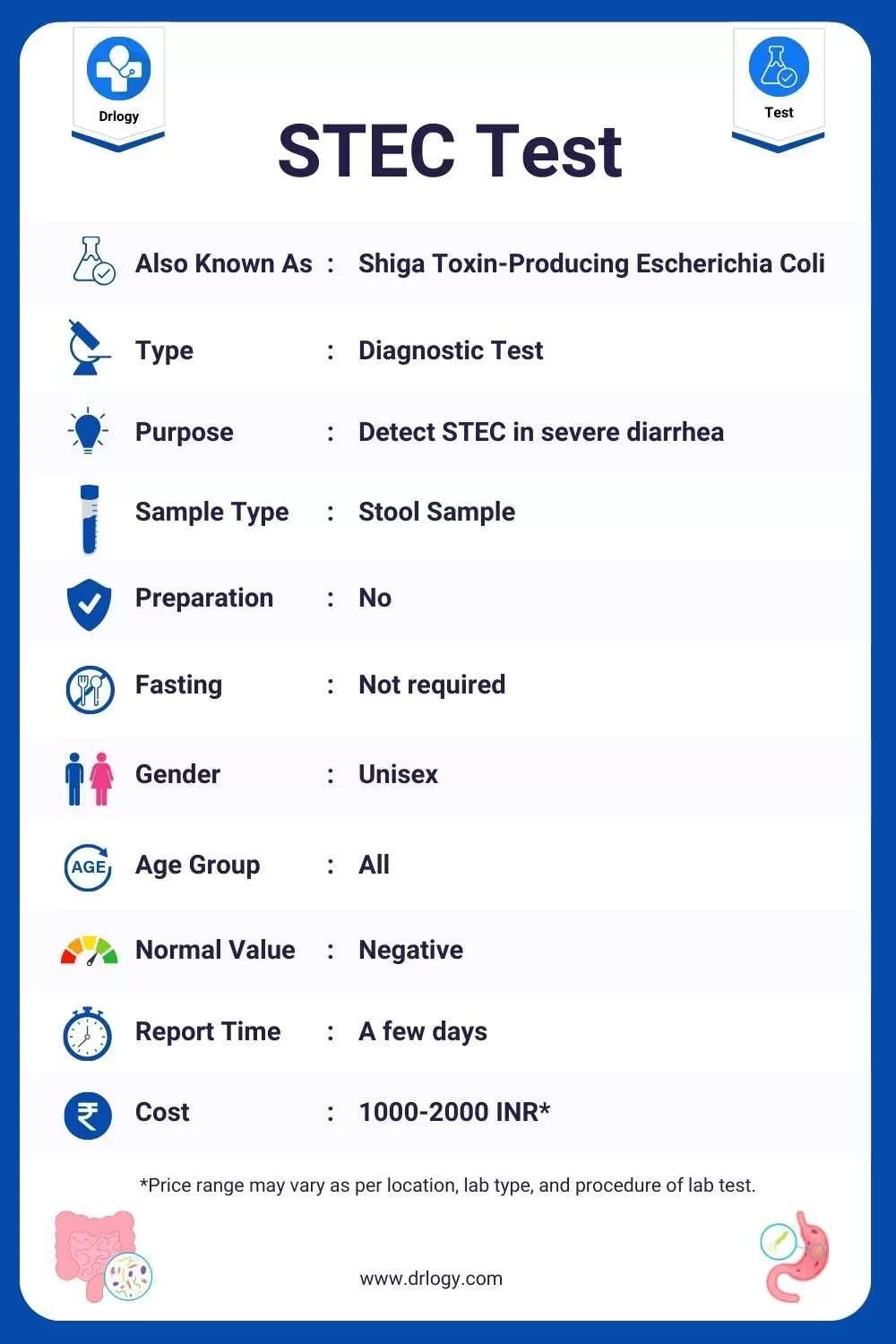
The Shiga Toxin-Producing E. coli Test is a medical examination to identify harmful E. coli bacteria that can lead to severe diarrhea. It helps diagnose infections caused by these bacteria, especially during outbreaks or food-related illnesses.
Here are the basic details of the Shiga Toxin-Producing Escherichia Coli Test.
| Also Known As | Shiga Toxin-Producing Escherichia Coli Test |
| Type | Diagnostic Test |
| Purpose | Detect STEC in severe diarrhea. |
| Sample Type | Stool Sample |
| Preparation | No |
| Fasting | Not required |
| Gender | Unisex |
| Age Group | All |
| Normal Value | Negative |
| Reporting Time | A few days |
| Cost |
1000-2000 INR* |
*Price range may vary as per location, lab type, and procedure of lab test.
Shiga Toxin-Producing Escherichia Coli (STEC) test detects harmful bacteria causing infections, primarily severe diarrhea.
The purpose of the Shiga Toxin-Producing Escherichia Coli Test is to:

Here is the basic preparation for the Shiga Toxin-Producing Escherichia Coli Test.
Here is the basic Shiga Toxin-Producing Escherichia Coli Test Procedure.
Here is the normal result of the Shiga Toxin-Producing Escherichia Coli Test.
| Test | Normal Result |
|---|---|
| Shiga Toxin-Producing Escherichia Coli Test | Negative for STEC |
Here is the Interpretation of the Shiga Toxin-Producing Escherichia Coli Test.
| Test Results | Interpretation |
|---|---|
| Positive | STEC infection detected. |
| Negative | No STEC infection found. |
| Further Evaluation | For unresolved cases or suspicion. |
Shiga Toxin-Producing Escherichia Coli Test detects STEC infections, aiding in diagnosis and public health control.
Here are the potential causes of positive STEC Test results:
| STEC Test Positive Causes | Description |
|---|---|
| Gastrointestinal Infections | STEC infection linked to severe diarrhea. |
| Hemolytic Uremic Syndrome | Possible complication, especially in children, can lead to kidney failure. |
Positive STEC test results indicate gastrointestinal infections, sometimes leading to hemolytic uremic syndrome.
Here are the potential causes of negative STEC Test results:
| Possible Causes | Description |
|---|---|
| Non-STEC Gastrointestinal Infections | Other pathogens like viruses, bacteria, or parasites. |
| No Infection | A non-infectious cause, such as dietary issues. |
Here are the specimen requirements for the Shiga Toxin-Producing Escherichia Coli Test.
|
Specimen |
Stool or rectal swab placed in stool culture transport vial |
|
|
Volume |
1 to 2 g, 1 to 2 mL, or one swab |
|
|
Container |
Use a culture swab to collect rectal or fecal samples, then place it in a stool culture transport vial. |
|
|
Storage |
Room temperature |
|
|
Causes for Rejection |
Leakage, dry sample, fixative, expired transport, inappropriate conditions, delay, frozen, wooden swab, unlabeled, name discrepancy. |
|
Here is the basic limitation of Shiga Toxin-Producing Escherichia Coli Test.
Here are some of the risk factors of the Shiga Toxin-Producing Escherichia Coli Test.
Here are the Doctor's recommendations or consult a specialist after the Shiga Toxin-Producing Escherichia Coli Test.
| Test Result | Visit Doctor | Reason |
|---|---|---|
| Positive | Infectious Disease Specialist | Confirm treatment, prevent complications. |
| Negative | Primary Care Physician | Investigate other causes of symptoms. |
Here are the estimated Shiga Toxin-Producing Escherichia Coli Test Prices in India with different top cities:
|
City |
Price Range (INR)* |
|
1000-2000 |
|
|
1000-2000 |
|
|
1000-2000 |
|
|
1000-2000 |
|
|
1000-2000 |
|
|
1000-2000 |
|
|
1000-2000 |
|
|
1000-2000 |
|
|
1000-2000 |
|
|
1000-2000 |
|
|
1000-2000 |
|
|
1000-2000 |
|
|
1000-2000 |
|
|
1000-2000 |
*Prices are approximate and vary depending on a specific laboratory or healthcare facility.
Summary
Overall, The Shiga Toxin-Producing Escherichia Coli (STEC) test is vital for detecting STEC infections, especially during outbreaks and food-related illnesses. Also check Drlogy Test for detailed information about all medical tests for patients, doctors, scholers and medical students.
Reference
DOCTOR'S MOST TRUSTED HEALTHCARE PLATFORM
10M+
Patients
30000+
Doctors
25000+
Hospitals/Labs
Copyright © 2025 Drlogy. All rights reserved.